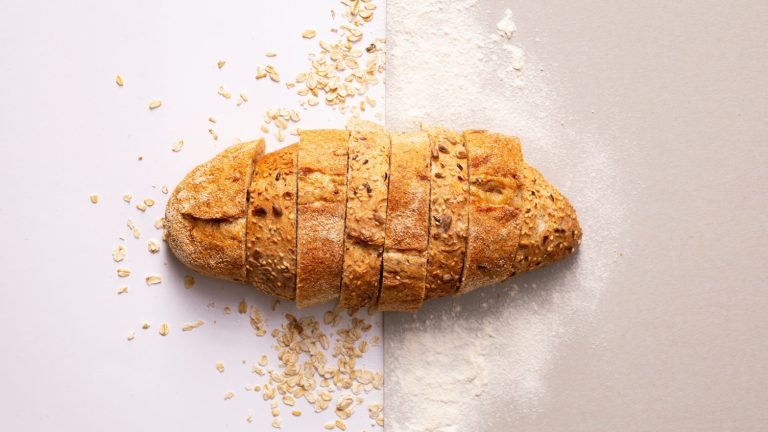Carbs have a bad reputation for being responsible for weight gain. But are such claims really justified, and are there certain carbohydrates that benefit you? Let’s take a look!
Carbohydrates are an essential part of the natural world. Together with proteins, lipids, and nucleic acids, they form the basis of all living things. So how did we manage to make them into the main villain of almost every nutrition story?
Types of carbohydrates
Carbohydrates (or saccharides) are the key energy source for the majority of life. They are also necessary for the synthesis of glycogen and fatty and amino acids. In our food, they are represented as sugars, starches, and fibres.
Based on the chemical structure and complexity, we divide them into monosaccharides (basic units), disaccharides, and polysaccharides (the most complex).
Carbs have a range of functions, the most important being an energy source. They also provide structural support (cellulose and lignin in plants and fungi) and act as receptors to enable communication between cells.
A list of good and bad carbs
You have heard about “good” and “bad” carbs, but you don’t know what that means and where to find each? We give you the answers.
Simple carbs (monosaccharides and disaccharides) are sugars found in fruits, vegetables, milk and dairy. Simple carbs are also sugar added to food during processing. They have low fibre content, increase our blood sugar rapidly, and make us hungry soon after eating them. They are what we like to call “bad” carbs, but they have their uses. For athletes, for example, they provide a quick source of energy. Simple carbs are white bread, pasta, and rice, and refined foods (snacks).
Complex carbs (polysaccharides) are wholegrain foods, vegetables, beans and legumes. They are the “good” carbs. Because they are rich in indigestible fibre, they slow down the absorption of nutrients – including carbohydrates. This leads to a slower increase of blood sugar and less insulin released. High-fibre foods also keep you full for longer.
Are low-carb and no-carb diets healthy?
Atkins, keto or LCHF, and many other diets restrict or completely cut off carbohydrates from your diet. They promise rapid weight loss by forcing our bodies to burn stored fat instead of carbohydrates.
Are carbohydrates essential nutrients? No – our body is capable of producing them from fats and proteins. So we could, theoretically, get all our energy from fats and proteins.
But carbs are essential for the brain, which needs glucose as fuel because our brain cells, neurons, are unable to use fat as energy. As the ultimate source of energy, they can also support your athletic performance! Read more about this here.
Many believe that increased consumption of carbohydrates is the main reason for obesity. This conviction has led to a rise of low-carb or even no-carb diets. But obesity is a consequence of many factors besides nutrition – from an inactive lifestyle and inadequate sleep to stress and even higher living standard.
And because only balanced nutrition gives your body everything it needs, cutting one food group from your menu completely is never a smart thing.

Carbs and diabetes – what is the connection?
We already mentioned that simple vs complex carbs have a different influence on our blood sugar. Let’s explain how that works.
When you eat carbs, your body breaks them down into glucose, which enters your bloodstream. There it increases blood sugar levels. So when we say “blood sugar”, what we actually mean is “glucose content in blood”.
Your body quickly responds by making your pancreas release the hormone insulin. It prompts your cells to absorb sugar from blood to either use for energy or store. As your cells are busy collecting glucose, your blood sugar drops back down.
If we eat a lot of simple carbs which results in a rapid increase in our blood sugar, we force our bodies to produce large quantities of insulin. This can overburden our pancreas and lead to diabetes.
Discover the relationship between carbs and genes
Genes have quite an influence on your body’s reaction to carbohydrates through two genes – FTO and KCTD10.
And for people with a favourable variant of the FTO gene carbohydrates are not only the source of energy but also a protection against obesity. If those people don’t consume enough carbs, they are 3-times more susceptible to becoming overweight, compared to people with two common variants of the FTO gene. Lucky, right? But we are talking about complex or good carbs – snacks don’t count!
The KCTD10 gene determines the relationship between the intake of carbohydrates and the HDL cholesterol level. People with a risk variant of the KCTD10 gene need to ensure that their nutrition contains enough carbohydrates to maintain healthy levels of HDL (good) cholesterol. For them, it is even more important to eat enough high-quality carbs with lots of fibre.
Knowing how your genes determine how much carbohydrates your body needs is a sure-proof way to give your body what it needs to be in peak performance. Based on this and other nutrition-related traits, your genes can also reveal what type of diet is the most optimal for you.
So don’t cut carbs from your menu. Instead, learn to understand them, befriend them, and you will be able to get the most out of what they have to offer.

















